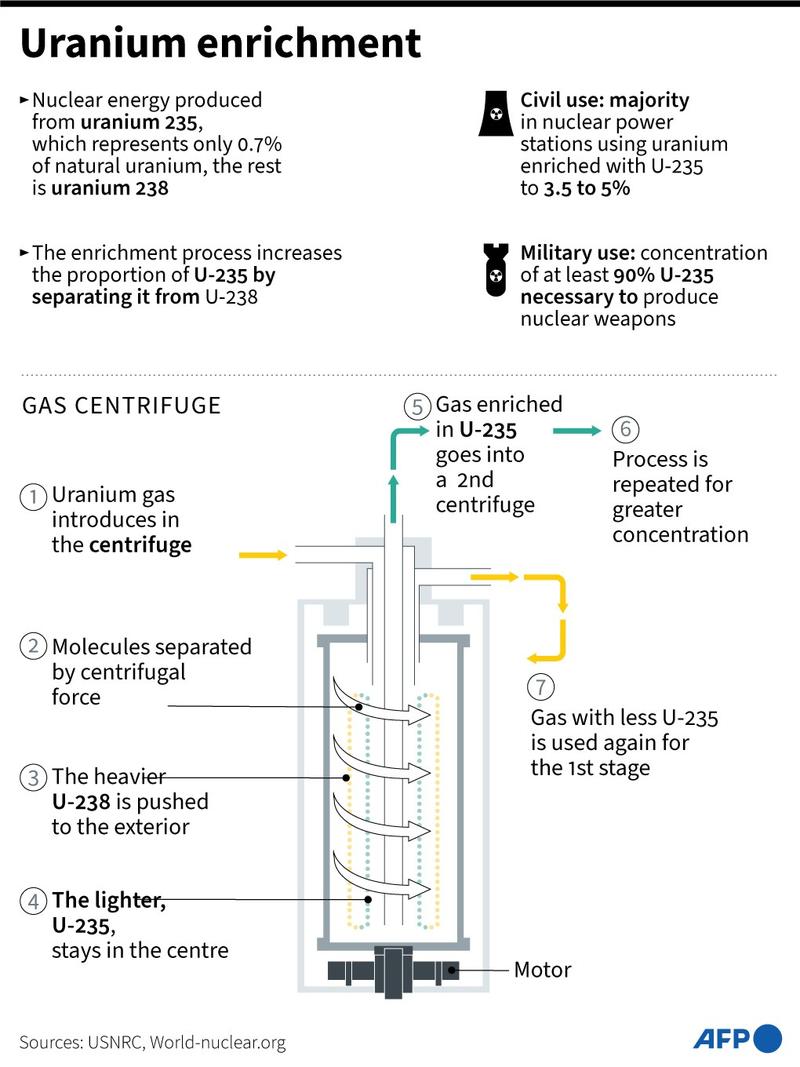 The process of enriching uranium by using a centrifuge.
The process of enriching uranium by using a centrifuge.
TEHRAN - Iran said it had enriched uranium close to levels needed to make a weapon, adding to obstacles facing diplomats as they try to revive the 2015 nuclear pact that curbed the Islamic Republic’s nuclear program in exchange for sanctions relief.
The first 60-percent-enriched uranium was obtained at 12:40 am local time on Friday, the semi-official ISNA news agency reported, citing parliament speaker Mohammad Baqer Qalibaf.
Iran’s nuclear agency chief Ali Akbar Salehi later said around 9 grams of the material was being produced per hour at the Natanz nuclear site, though the amount could drop to 5 or 6 grams as the facility simultaneously produces uranium enriched to 20 percent.
ALSO READ: Iran says began 60% uranium enrichment after Natanz incident
Iran’s nuclear agency chief Ali Akbar Salehi later said around 9 grams of the material was being produced per hour at the Natanz nuclear site, though the amount could drop to 5 or 6 grams as the facility simultaneously produces uranium enriched to 20 percent
The move is Iran’s response to an attack on Sunday on its biggest enrichment facility at Natanz that it blamed on Israel, the latest in a series of claims by the regional foes that are roiling the Persian Gulf. It moves Tehran’s enrichment significantly closer to the 90 percent concentration of uranium-235 isotopes used in nuclear weapons. Iran says its nuclear program is peaceful and that the material will be used for medical treatments.
The attack only affected one of the halls at Natanz and didn’t halt enrichment, Salehi said, adding that the main power unit at the facility would be restored later Friday.
Diplomats from Iran, the US, Russia, China, the UK, France and Germany gather in Vienna again on Friday as they attempt to orchestrate the lifting of US sanctions and steps Iran can take to wind back its nuclear activities.
Under the Iran nuclear deal, officially known as the Joint Comprehensive Plan of Action (JCPOA), Iran is allowed to enrich uranium only up to 3.67-percent purity and its stockpile should not be more than 300 kg.
However, Iran has been scaling down its compliance to its JCPOA obligations since the United States withdrew from the deal in May 2018 and reimposed sanctions on the country. On Jan 4, Iran started to produce uranium enrichment of 20-percent purity.
Iranian Foreign Minister Mohammad Javad Zarif said on Thursday that Iranian nuclear delegates will not engage in "attritional" negotiations only "for the sake of negotiations".
"As we did not accept talks leading to a photo op in the past four years, today we will seriously refuse to engage in negotiations for the sake of negotiations as well," he wrote on social media late at night, as quoted by Iran's Press TV.
READ MORE: Iran 'boosts uranium enrichment capacity to 16,500 SWUs'
Zarif thanked the support for the negotiation team by Iran's Supreme Leader Ayatollah Ali Khamenei, amid voices in Tehran calling for an end to the Vienna talks over the 2015 nuclear agreement, formally known as the Joint Comprehensive Plan of Action (JCPOA).
Khamenei's advice to refrain from attritional negotiations "has always been a beacon for us," Zarif wrote.


